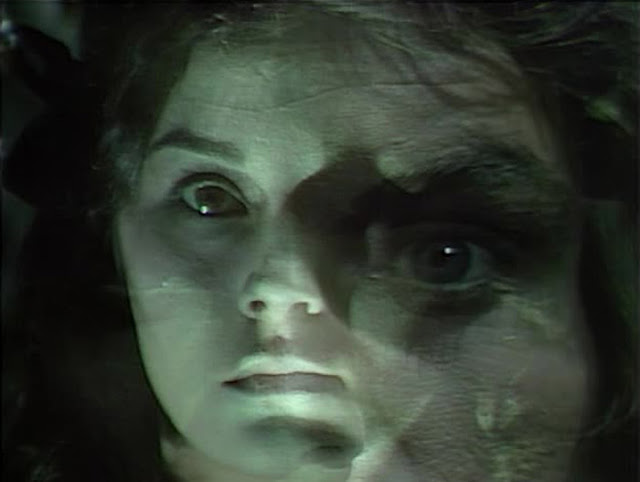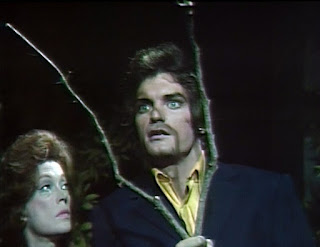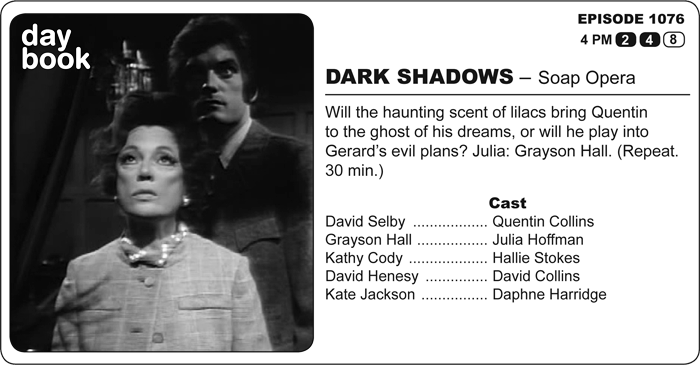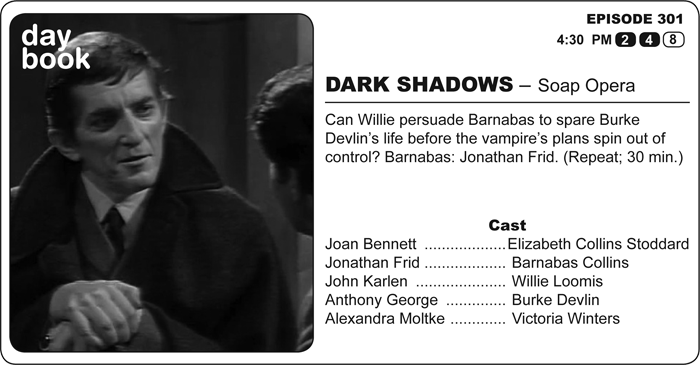By PATRICK McCRAY
Taped on this day in 1970: Episode 1079
When the power of a gorgeous ghost compels him, will Quentin complete an exorcism before the spirits change David’s wardrobe? Quentin: David Selby. (Repeat; 30 min.)
Daphne leads Quentin to a graveyard to see familiar tombstones. He vows to help, but it’s clear she has mixed intentions. He later tries to exorcise the house, but Daphne’s influence strops him. Meanwhile, Hallie goes from slave to the ghosts to the realization that she’s their prisoner as she and David attempt a seance.
I’m not sure what’s going on in this episode or storyline, but I can’t stop watching it. If anything is my takeaway on Dark Shadows, it’s that. Beginning with Vicki’s parentage, it’s a program about withholding information. 1079 elevates the unspoken to its rarest expression. That kind of ambiguity draws the audience into the storytelling process, and the rigor of it in this is equally demanding and rewarding. Some of the power of Gerard’s plan, if we can even call it a plan, is its allusiveness. The ultimate goal is the destruction of Collinwood, but fewer knives have been as serrated, and the horror of Gerard (since we know where it’s going) lies in the unnecessary damage he causes to those he’s marked for death or madness, anyway.
When the episode isn’t reveling in repressed sexuality, it’s venturing a little too boldly into deeper taboo on a rubber raft of counterfeit ambiguity. It begins with a visual metaphor so bold there might be no meta left at all. We find Quentin in the graveyard as Daphne points out her own tombstone. Quentin must have some sort of partial memory of being a ghost or being dead, or a sense of it, because even though the timeline has changed, he was once a zombie, after all. And he certainly understands being from another time. Given that, a dead woman from the 1800’s is someone Quentin can't resist. Is she silently imploring his help, or is he simply assuming that? Considering that, as they begin their embrace, she's holding a knife at his back without his knowledge, it sums up far, far too many relationships.
As the episode goes on, Selby gets to show an amazing range of sincerity and furtiveness as he attempts to exorcise the home, and probably its temptations, eventually sabotaging those same efforts and lying about it. Not only is he lying about it, he's enjoying the process. As he lies to Julia about the extent of Daphne's control at the end of the episode, he has a naughty, hostile smile that is worthy of Jack Torrance. And it's an example of a very human, very subtle moment that exists completely in the face. It really has no formal name, but David Selby has a disturbing degree of control of it nonetheless.
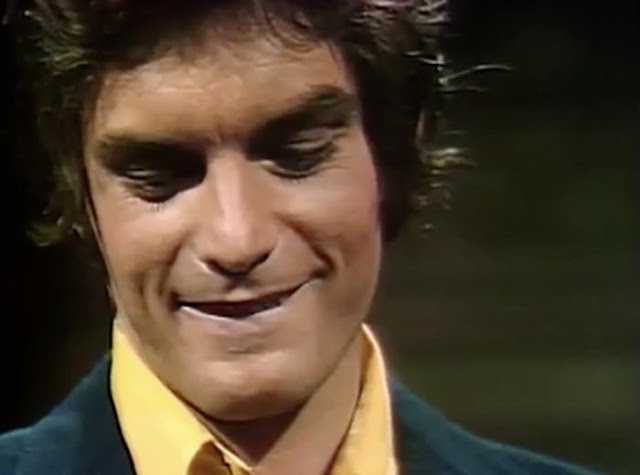
David and Hallie dominate the rest of the episode, forced into playrooms and roleplay with dialogue that you have to strain to hear as single entendre. This is difficult subtext to confront because of the singularly awkward age of the performers. Both were around fifteen, neither adults nor children. In an effort not to sexualize them (ewww), the show goes too far in the other direction as it vaguely infantilizes them. The net result feels even more perverse than if they’d let them be fifteen. The exact reason for insisting that David dress up and submit to the whim of a beautiful ghost (who is nearly his age peer) is unclear and disturbing because of that murkiness. The substitute costumes only further this. The selected outfits are of both the early 70’s and the 1840’s. They are the costumes of a very formal child or a very fanciful adult. Which is it? Which does Gerard want them to be? All of it, as long as it’s in paralyzing quantities. Gerard wants the adult David to know exactly what’s being done to him while the child David knows he’s powerless to stop it.
This episode hit the airwaves on Aug. 13, 1970.

